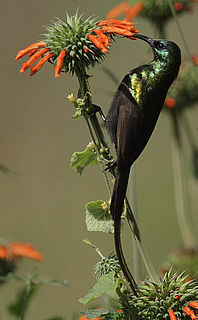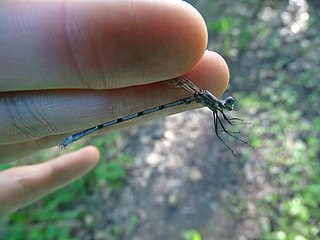
The conservation status of a group of organisms indicates whether the group still exists and how likely the group is to become extinct in the near future. Many factors are taken into account when assessing conservation status: not simply the number of individuals remaining, but the overall increase or decrease in the population over time, breeding success rates, and known threats. Various systems of conservation status exist and are in use at international, multi-country, national and local levels as well as for consumer use.

A least-concern species is a species that has been categorized by the International Union for Conservation of Nature (IUCN) as evaluated as not being a focus of species conservation. They do not qualify as threatened, near threatened, or conservation dependent.

A near-threatened species is a species which has been categorized as "Near Threatened" (NT) by the International Union for Conservation of Nature as that may be endangered in the near future, although it does not currently qualify for the threatened status.

The bronzy sunbird is a species of bird in the family Nectariniidae. It is found in Angola, Burundi, Democratic Republic of the Congo, Ethiopia, Kenya, Malawi, Mozambique, Rwanda, Tanzania, Uganda, Zambia, and Zimbabwe.
Eodiaptomus lumholtzi is a species of copepod endemic to Australia. It is one of only two species in the family Diaptomidae to occur in Australia, the other being Tropodiaptomus australis. It is listed as a vulnerable species on the IUCN Red List.
Thermosphaeroma macrura is a species of isopod in the family Sphaeromatidae. It is found in Mexico.
Thermosphaeroma milleri is a species of isopod in the family Sphaeromatidae. It is found in Mexico.
Thermosphaeroma smithi is a species of isopod in the family Sphaeromatidae. It is found in Mexico.
Tropodiaptomus burundensis is a species of calanoid copepod in the family Diaptomidae.
Tropodiaptomus is a genus of copepods in the family Diaptomidae. It includes the following species, many of which are narrow endemics and are included on the IUCN Red List :
Tropodiaptomus ctenopus is an extinct species of calanoid copepod in the family Diaptomidae.
Tropodiaptomus falcatus is a species of calanoid copepod in the family Diaptomidae.
Tropodiaptomus kissi is a species of calanoid copepod in the family Diaptomidae.
Tropodiaptomus madagascariensis is a species of calanoid copepod in the family Diaptomidae.
Tropodiaptomus neumanni is a species of calanoid copepod in the family Diaptomidae.
Tropodiaptomus simplex is a species of calanoid copepod in the family Diaptomidae.
Tropodiaptomus stuhlmanni is a species of calanoid copepod in the family Diaptomidae.
Tropodiaptomus worthingtoni is a species of calanoid copepod in the family Diaptomidae.

Lestes disjunctus, the northern spreadwing, is a species of spreadwing in the damselfly family Lestidae. It is found in North America.



